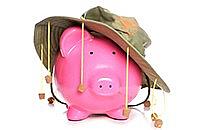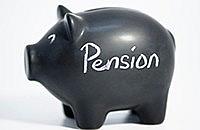A kinder egg this year?
Our Money Expert Amanda Blinkhorn asks whether Easter spending should go into a nest-egg…

I must remember to get Easter eggs this weekend – last year I left it to the last minute and ended up with the Easter Bunny delivering the Easter equivalent of novelty socks and a petrol station torch. Instead of a treasure hunt of lovingly hidden pastel and speckled eggs round the garden, Old Harvey ended up laying a trail of Maltesers that looked uncomfortably close to giant bunny droppings.
I did a lunchtime recce at Marks & Spencer yesterday and the analogy with Christmas was reinforced – everywhere you looked, there were new ways to empty your bank account and more things to feel deprived of, if you kept your credit cards close to your chest. I’d be lying if claimed I didn’t enjoy my choccy window shop, and I’m sure I’ll end up buying some of the cheaper, cuter fluffy chicks and mini eggs – I might even make some chocolate Rice Krispies nests to put them in. What I won’t be doing, though, is buying a wreath of Easter eggs to hang on the door, or a purple polystyrene egg tray of a dozen cream eggs. Since when did we start decorating the house at Easter or supplementing a breakfast splurge of a couple of proper Easter eggs (giant over-packaged egg, containing a chunky mug and a packet of Smarties) with the Easter equivalent of a Christmas stocking and a lifetime supply of mini eggs?
I can feel an “in my day” anecdote hovering, so I’ll move on, but I am beginning to wonder whether it would be kinder to give the kids a start-up nest egg instead. Browsing round the chocolate aisles, I could easily blow £25 on each of the four kids this Easter, leaving them with nothing but a pile of crinkled silver paper, some cardboard and a slightly sick feeling by the end of Easter Sunday.
Multiply that wasted £100 by ten and I’d have the £1,000 I needed to get the eldest a Help to Buy ISA aka a £3,000 freebie from the Government to put towards a deposit down on your first home. Before you blanch at that £1,000, that’s roughly what most of us spend on takeout coffee and snatched sandwiches at our desk every year – a fiver a day, £25 a week, £100 a month.
A Help to Buy ISA (expected to be launched in September) would mean the Government contributes £50 a month for every £200 you save up towards a deposit, up to a maximum of a £3,000 bonus (which would mean saving £12,000 yourself). Of course I’d have to save up a new one for each of the kids over the next four years. If not, the fight over it is going to make the annual scrap over who gets the Dr Who mug and who ends up with the Cadbury mini-eggs one look like tea time at Downton Abbey.
Amanda Blinkhorn is a freelance journalist who has been writing about money, family life and everything in between since she was 19.
She blogs here almost every day and writes the Money Matters finance column in Candis magazine as well as for The Sunday Times and other newspapers and magazines. She lives in London with her four children aged between 8 and 19. She has almost finished training to be an adult literacy teacher and will qualify this summer, if she ever finishes those pesky essays.







Leave a Reply
Please login or register to leave a comment.